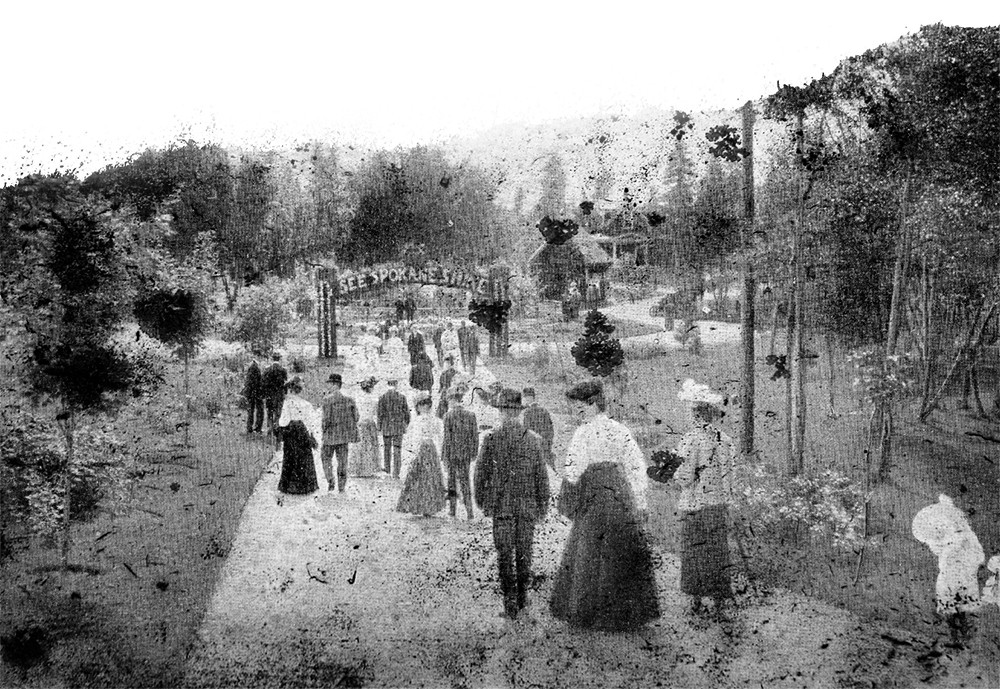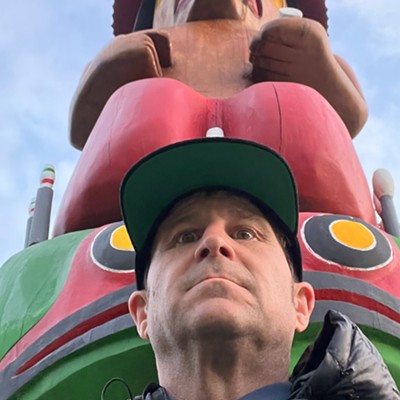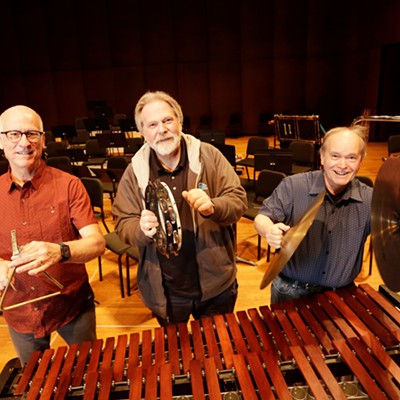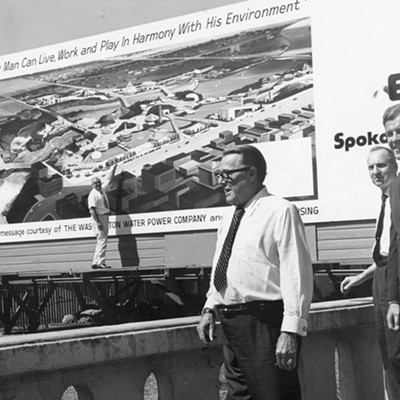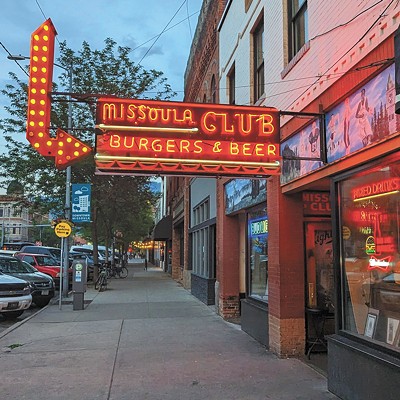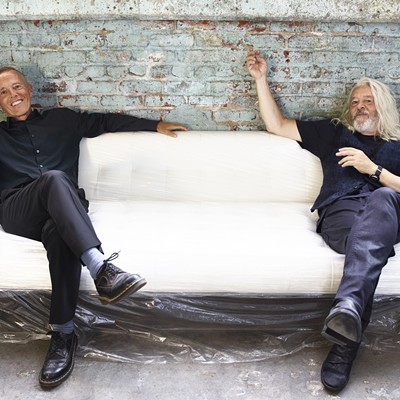Liz Wood and Devon Kelley have been telling each other stories about all things creepy, crawly, historical and haunted for more than 20 years. It started when they became fast friends at Chase Middle School over their shared scary reading preferences, continued through their teen years and then as roommates in their 20s in a house that may or may not have been possessed with otherworldly spirits.
Nearly two years ago, Wood and Kelley decided to share some of their storytelling with the rest of the world via their Ouija Broads podcast, a Pacific Northwest-focused weekly dive into strange tales they find via old-fashioned research in history books, science texts and the like. That makes sense considering both their adult lives have led them toward historical research — Wood is an assistant professor and researcher of health policy at WSU-Spokane, and Kelley got a master's degree in museum studies and now works at the Old South Meeting House in Boston.
"We've both always liked weird, witchy, interesting, spooky stuff, and the historical stuff, too, is fascinating," Wood says. "One of the reasons I like policy and government stuff is there's nothing I like more than finding out about how strange people were in the past. We tend to think of them as having a really coherent worldview and doing things in a very logical way, and really it was a bunch of fools muddling through just like us."
They record the Ouija Broads episodes — now at 84 and counting — through phone calls they each individually record, then Wood takes the recordings and edits them together into what sounds to the listener like a seamless and often hilarious discussion. Among the subjects tackled in recent episodes are UFO visits to Washington, mysterious sightings of giant black cougars, and the Cedars, which Wood calls "basically a concentration camp for women with STDs in Oregon."
"My favorite thing to talk about on the show are the animal stories," Kelley says. "Cryptids [aka, an animal whose existence is questionable], but also the really neat biodiversity of the Pacific Northwest that seems strange to folks just because maybe they haven't been introduced to it yet. One of my favorite episodes to research was about the Shunka Warakin, which is a wolf-like cryptid in Montana, and the recently discovered 'swimming wolves' of British Columbia. It was a good contrast of lore, with contemporary research."
Launching the podcast served as a way for the two friends to talk regularly, and that's about to get easier as Kelley prepares to move to Seattle in November. The work it takes to make an episode is pretty intensive — "a weekly schedule is maybe a decision I would not make again," Wood says with a laugh — but their shared passion for the odd and macabre comes through. As does their long friendship.
"Hands down, the best part of doing this show with Liz is that she cracks me up," Kelley says. "Just absolutely makes me laugh so suddenly and so loud that I may as well be barking."
Maybe "The Case of the Barking Podcast Host" will make for a future episode. In the meantime, the Ouija Broads share five of their favorite Spokane-related weird people, places and legends, in their own words:
The Hahn Mansion
2525 E. 19th Ave.
This home on the South Hill started as a love nest for Sarah "Hecla" Smith, the boy-toy of a silver mine magnate. But thanks to his philandering, the lovebirds never spent any happy hours together there. Several husbands later, Hecla disappeared in Canada. Her worried relatives attempted to track her (and the inheritance) down, but their quest ended with Hecla's lawyer's wife handing them a bag of ashes: the earthly remains of Sarah (and no inheritance to go with them).
Next, the house became the property of "Dr." Rudolph Hahn, a self-taught lobotomist and abortionist. On Hahn's watch, the property saw some mighty weird times, including: a car being driven into a pool, booming speakers hanging from the trees, and a playful young Lt. Jimmy Doolittle dive-bombing the house for Hahn's entertainment. Unfortunately, the home also had a dark side. Hahn and his wife, Sylvia, had one of those relationships where you file for divorce repeatedly, accuse each other of abuse, and occasionally chase each other out of the house with a sword. The police were called to the mansion on a May evening in 1940 by Dr. Hahn, who said his wife had shot herself in the head. Hahn, who was "drunk as a hoot owl" according to the officers, was investigated but never charged with her death, which was ruled a suicide.
Years later, Hahn himself was stabbed to death with a bayonet from his own antique weapons collection. At the time, he lived in room 503 of the New Madison Hotel (First and Madison). Instead of haunting his homes, Hahn's ghost still evidently pushes around his old desk in his former office in the Raznik Building (309 W. Riverside Ave.).
The Marks Family's Curse Corner
Post & Spokane Falls Blvd.
Not everyone waits until their death to visit misfortune upon those who have wronged them. The Spokane Police Department committed an illegal search and seizure in two homes belonging to the Marks clan in 1986. To cover all their bases, Marks paterfamilias Jimmy Marks both sued the Police Department and cursed Spokane City Hall, as well as asking his deceased father to haunt city officials. Jimmy attributed many of the city's misfortunes, scandals and shames to his curse until his death in 2007. While Jimmy is gone, his family still practices palmistry from Sister Jane's home (802 S. Thor St.), and a former palmistry building they owned on East Sprague has recently been purchased for renovations (1914 W. Sprague).
Manito Park
It's a lovely old place on Spokane's South Hill that boasts a Japanese Garden, a formal garden, a rose garden, and the lilacs that gave the Lilac City its name. But in its early days, Manito Park was the home of many ambitious projects meant to lure Spokanites to the new development — including a spark-flinging, horse-startling electric trolley and a loosely supervised zoo where a bear once tore the arm off a young girl. A different bear escaped at one point and they gave up looking for it after four days. The area itself seems to bring out a strange side of Spokane folks: someone once robbed a guy who was driving a morgue wagon; the famous Spokane architect Kirtland Cutter got kicked in the ass, literally, by his wife's ex when he was getting off the trolley; various dead bodies have appeared. You can find the iron rings where they used to tie the bears during cage-cleaning time still in the rocks behind the Park Bench Café.
The Post Street Bridge
For 54 years, the water under this bridge concealed the murder weapon from the nation's coldest case. During the Great Depression, some corrupt Spokane cops robbed a creamery with some friends (yes, butter was a luxury worth stealing). During the crime, a Newport city marshal was shot and killed. They flung the murder weapon off the Post Street Bridge, where it stayed until 1989 when sheriff and local historian Tony Bamonte retrieved it (see Timothy Egan's Breaking Blue for details). The bridge itself was responsible for several deaths when it collapsed during its initial construction in 1917, throwing dozens of workers into the water.
The Spokane St. Hotel
162 S. Spokane St.
Behind the bright yellow and orange of the Marilee Apartments, a faded yellow arrow points to a dark red building. That is the remains of the Spokane Street Hotel, where Frank and Tessie Pozar spent their springs and summers, while fall and winter were spent in Hawaii. Frank and Tessie were supposed to make their usual pilgrimage to Hawaii on Oct. 30, 1984, but never made their flight. Their Hawaii friends assumed they were staying late in Spokane, and their Spokane friends assumed they were already in Hawaii. And so it was early 1985 before people realized the couple was missing — and remain so until this day. Their son Frank Jr. was arrested for cashing his parents' savings bonds, using their credit cards and signing their names to checks after their disappearance. After being questioned about their deaths, Frank left town. His whereabouts are now unknown as well. Frank and Tessie's packed suitcases were eventually found in the basement of the hotel. ♦

